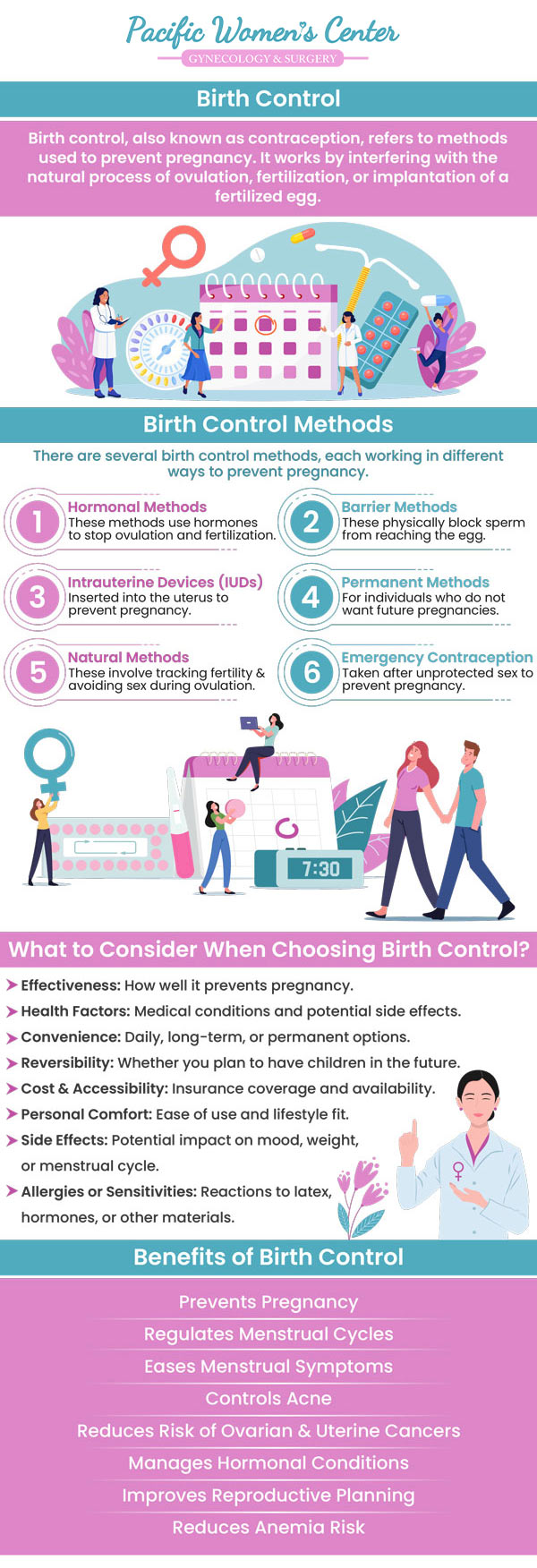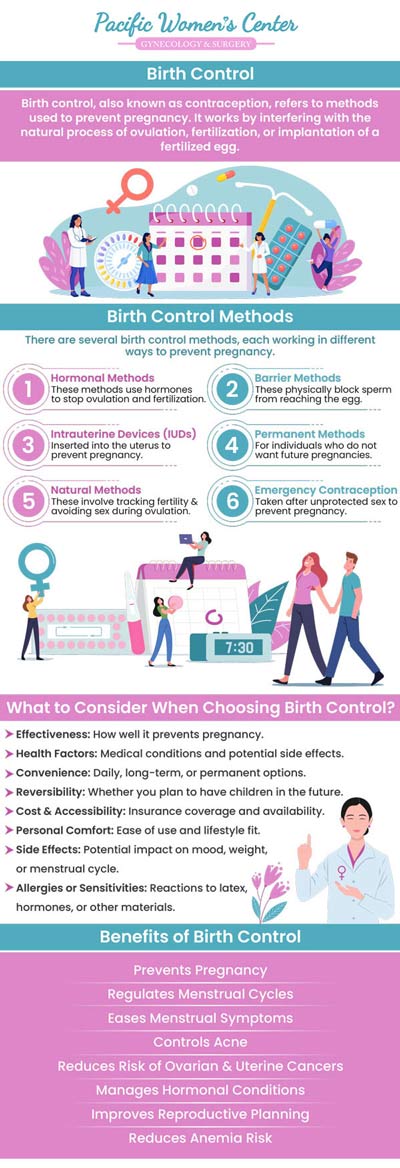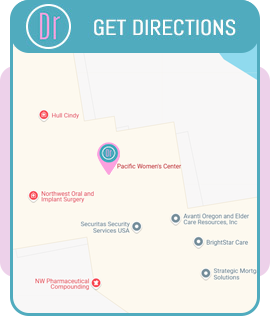What Should You Know About Your Options for Birth Control?
At Pacific Women’s Center in Eugene, OR, Dr. Richard Beyerlein, MD, CPI, FACOG, and Dr. Tamara A. Stenshoel, MD, FACOG, offer comprehensive guidance on the many birth control options available to you. From hormonal methods like birth control pills, IUDs, and implants to non-hormonal options like copper IUDs and natural methods, our team helps you choose what best fits your lifestyle and health needs. We take into account factors such as your medical history, convenience, and personal preferences to create a tailored birth control plan. For more information, contact us or schedule an appointment online. We are conveniently located at 911 Country Club Rd. Suite 222, Eugene, OR 97401.


Table of Contents:
How long does it take for birth control to start working?
What should I consider when choosing the right birth control for me?
Can birth control affect my fertility once I stop using it?
How do I know if a specific birth control method is right for my lifestyle?
At Pacific Women’s Center, when considering how long it takes for birth control to start working, it’s important to note that the timeframe can vary depending on the type of contraceptive. Our healthcare providers can offer detailed consultations to explain these differences and help you make an informed choice.
For those opting for combination birth control pills, which contain both estrogen and progesterone, effectiveness can begin immediately if the first pill is taken within five days of the start of your menstrual cycle. If you start at another time, it typically takes about seven days for the pills to become effective, during which we recommend using an additional form of contraception, such as condoms.
If you’re considering progestin-only pills, also known as the mini-pill, our providers will advise you that taking the pill within the first five days of your period ensures immediate effectiveness. Starting at any other point requires backup contraception for at least 48 hours.
For other birth control methods like the implant, injection, or hormonal IUD, our team will guide you through the timing for achieving optimal effectiveness. Implants and injections are usually effective immediately if administered during the first five days of your menstrual cycle, while hormonal IUDs provide immediate protection if inserted within the first seven days. Barrier methods, such as condoms and diaphragms, offer immediate protection when used correctly every time, and non-hormonal IUDs are effective immediately after insertion.
When considering birth control options, it’s important to evaluate the effectiveness of each method in preventing pregnancy. Our healthcare professionals can provide detailed information on highly effective long-acting reversible contraceptives like intrauterine devices (IUDs) and implants, as well as other methods like condoms or diaphragms, which may have higher failure rates with typical use.
Your health and any underlying medical conditions are crucial in determining the most suitable method. For instance, if you have a history of blood clots, our providers can guide you toward safe options, avoiding estrogen-containing contraceptives. A thorough discussion of your medical history with our healthcare professionals will help identify the best choices for your unique situation.
We also consider your lifestyle and how it may affect your ability to use certain methods consistently. For those who prefer minimal daily attention, options like the IUD or implant might be ideal. Alternatively, if you seek more control over starting or stopping contraception, methods such as the pill or condoms might be more appealing.
Protection against sexually transmitted infections (STIs) is another important factor. Barrier methods like condoms are the only type of birth control that can help prevent STIs, which may be a priority for many patients.
At Pacific Women’s Center, your future family planning desires are key in this decision-making process. Whether you plan to have children soon or are certain you do not want children at all, our team can discuss flexible options or more permanent solutions like sterilization.
Generally, most forms of birth control do not have a long-term impact on fertility. Hormonal methods such as the pill, the patch, or the vaginal ring work by regulating hormones to prevent ovulation. Once you decide to stop using them, your menstrual cycles and ovulation typically resume within a few weeks to a few months, though individual experiences may vary.
Similarly, long-acting reversible contraceptives, like intrauterine devices (IUDs) and implants, do not have lasting effects on fertility once removed. Fertility usually returns quickly, often within the first month following removal. However, for injectable contraceptives like the Depo-Provera shot, it might take several months to over a year for ovulation to return to its normal pattern after the last injection.
At Pacific Women’s Center, we recognize that each person’s health journey is unique. Factors such as age and underlying health conditions can influence fertility independently of birth control use. If you have concerns about your fertility after discontinuing birth control or if you’re experiencing difficulties conceiving, our skilled healthcare providers at our fertility clinic are here to help. We offer comprehensive evaluation exams and personalized guidance to address any underlying issues and support you in achieving your family planning goals.
When choosing a birth control method at Pacific Women’s Center, it’s essential to consider how well it aligns with your lifestyle, preferences, and health needs. For those seeking convenience, options like intrauterine devices (IUDs), implants, or injections offer long-term protection with minimal maintenance. If you prefer more control or a method that can be easily discontinued, daily oral contraceptive pills or barrier methods like condoms might be better suited.
The choice between hormonal and non-hormonal methods is also important, with hormonal options like pills, patches, and rings offering benefits like cycle regulation and acne reduction. However, non-hormonal options like copper IUDs or condoms may be more suitable if you have concerns about hormone-related side effects. Your health history plays a crucial role in the decision-making process, especially if you have conditions that contraindicate hormonal use, such as a history of blood clots. Additionally, family planning goals should guide your choice—temporary methods like condoms or pills offer quick fertility return, while longer-term options like implants or IUDs provide extended protection but may delay fertility return once discontinued.
It’s also essential to choose a method that aligns with your comfort and ability to follow through with its requirements. At Pacific Women’s Center, we offer personalized consultations to ensure you choose the best option for your health, lifestyle, and values. Our providers are dedicated to helping you find the birth control method that fits your needs and supports your well-being.
At Pacific Women’s Center, we are committed to helping you make informed decisions about your reproductive health. With the guidance of Dr. Richard Beyerlein, MD, CPI, FACOG, and Dr. Tamara A. Stenshoel, MD, FACOG, you’ll receive expert advice on the best birth control options tailored to your needs. For more information, contact us or schedule an appointment online. We are conveniently located at 911 Country Club Rd. Suite 222, Eugene, OR 97401. We serve patients from Eugene OR, Springfield OR, Coburg OR, Creswell OR, Cottage Grove OR, Lowell OR, and Junction City OR, and surrounding areas.

ADDITIONAL SERVICES YOU MAY NEED
❱ Abdominal Hysterectomy
❱ Bladder Lift Surgeon Q&A
❱ Cervical Cone Biopsy
❱ Colposcopy
❱ Endometrial Ablation
❱ Endometrial Biopsy
❱ Female Sexual Dysfunction
❱ Gynecological Surgery
❱ Gynecology
❱ Hormone Therapy
❱ Vaginal Hysterectomy
❱ Endometriosis Diagnosis & Care



